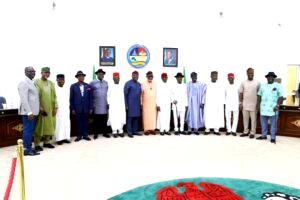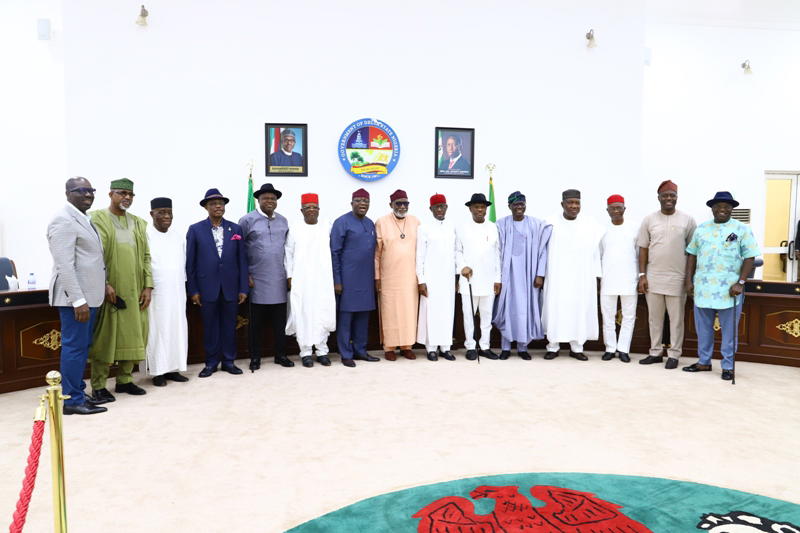

By Donu Kogbara
THE current power struggle between the governors of some Nigerian states and the Abuja-based Federal Government takes me back to my distant schooldays in Britain, when we were taught, in lessons about the late Mediaeval and early Renaissance periods of European history; about the endless tussles between overbearing monarchs and noble vassals determined to protect or expand their rights.
READ ALSO:Nigerian doctor, Osahon Enabulele, emerges President World Medical Association
These recalcitrant aristocrats have been described as “overmighty subjects”; and they constantly resisted domination and ganged up on their royal rulers. Fierce battles were regularly fought over issues like taxation and constitutions. Sometimes, troublesome noblemen, in Germany and England for example, emerged victorious from such skirmishes. Frequently, successful overmighty subjects were idolised by the masses. But, more often than not, kings or princes of yore were able to bring their overmighty subjects to heel; and the parallels between these long bygone, non-African conflicts and the rebellions that are hitting the headlines in Nigeria at the moment are perhaps surprising. The basic principles at stake are very similar. Ditto the dramatis personae. Nigeria’s 36 governors remind me very much of powerful regional dukes who are straining to liberate themselves from the even-more-powerful central government’s regal shackles.
Nyesom Wike, the populist and increasingly popular governor of oil-rich Rivers State, is taking legal action to prevent the Federal Inland Revenue Service, FIRS, from collecting Value Added Tax, VAT, in his domain and forcing Rivers to share the billions of naira it generates with unproductive states he regards as parasitical lame ducks. Wike, a leading member of the main Opposition party, the Peoples Democratic Party, PDP, and a born pugilist who has never knowingly minced a word, also delights in pointing out that it is ridiculous for tax proceeds from alcohol sales in Rivers, which is situated in the largely Christian South, to be dished out to northern Muslim states that have embraced sharia law and banned alcohol. Justice Stephen Pam of the Federal High Court sided with Wike last month; and the many Nigerians who passionately believe in restructuring, fiscal federalism and bringing the Muslim North (and Buhari’s Muslim Presidency) down a peg or ten hailed him as a hero. But the Court of Appeal swiftly put enforcement of Pam’s judgement on hold; and we are waiting, with bated breath, for the next instalment of this saga. Though Lagos and other states have followed suit and challenged FIRS, not all of the governors agree with Wike. There are exceptions to the rule, but it’s fair to say that the wealthier a state is, the more likely its governor is to reject the status quo. However, I’m told by someone who knows every governor that there are times when they all, chief executives of impoverished states and essentially obedient members of the ruling All Progressives Congress, APC, included, yearn to escape from the suffocating stranglehold of the Feds and enjoy more independence on their home turfs. According to my source: “Many of Wike’s colleagues envy him for having the funds – and, therefore, the freedom – to speak his mind. Many feel oppressed by Abuja, but dare not complain publicly because they are in hock to Abuja for handouts and bailouts. A couple of them even owe their positions to rigging that was arranged by Abuja mandarins via INEC (the electoral commission).”
The legislative lists in the Constitution provide for the distribution of powers: the exclusive legislative list is assigned to the Federal Government; the concurrent legislative list is assigned to both federal and state governments and defines areas in which both can legislate; and the residual legislative list is assigned to the states. The exclusive legislative list contains 68 items, while the concurrent legislative list contains 12; and this chronic imbalance – which cripples the states economically, makes political instability inevitable and fosters insecurity – needs to be urgently addressed.
True Federalism is supposed to encourage growth and the positive aspects of diversity, while simultaneously promoting national unity. Some of the most indebted states have considerable solid mineral resources, but their governors don’t have much clout because mining licences are awarded in Abuja, often to inept companies. Why? Natives of oil-producing Niger Delta states rarely get oil blocs or contracts, despite coming from communities that suffer extreme downsides of oil exploration and production – pollution, for instance. Why?
Most Nigerian governors are underwhelming, in my opinion; but some definitely have what it takes to dynamically drive development; and they should be allowed to get on with it and fly. Besides, it is not about individuals. It is about the principle. Restructuring is an idea whose time has come; and so many Nigerians, including this writer, are furious about the Federal Government’s refusal to do the right thing and start letting go.
OK so will Wike’s and other agitating governors’ wings be clipped at the end of the day? Or will they be able to extricate their fiefdoms from the clutches of faceless Abuja control freaks who are clinging to the choke chain as if their lives depend on their ability to unpatriotically hold this country back? And if Wike and others win their VAT crusade, will they up their games and relentlessly push for other forms of restructuring? Watch this space.
This is a slightly edited version of an article I wrote for The Africa Report magazine website (https://ift.tt/3eqzflT).
The post The ‘overmighty subjects’ of Nigeria appeared first on Vanguard News.


0 Commentaires